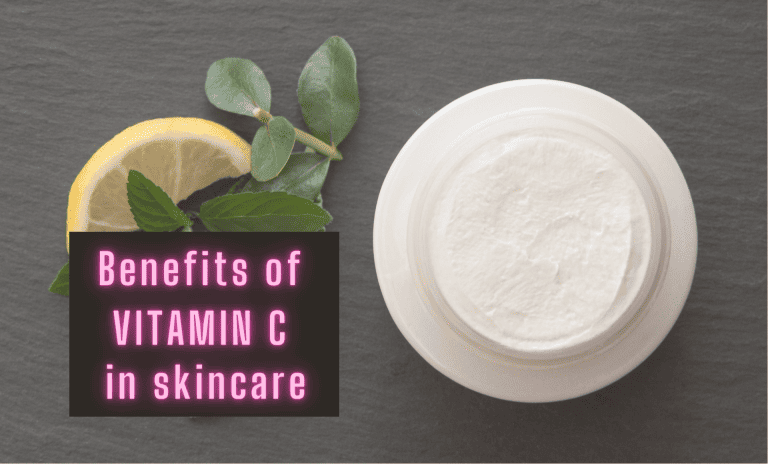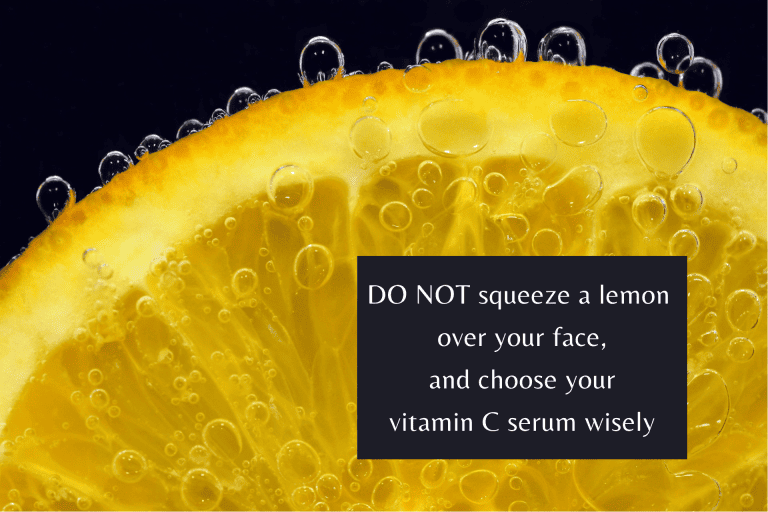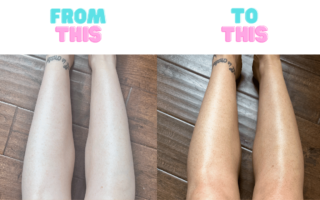
What is exactly vitamin C And why it should be an important part of your skincare
Vitamin C is one of the five most important ingredients you must have in your skincare routine. Here’s why!
Vitamin C, or ascorbic acid, is one of the most important vitamins needed for our health and body. Both on the outside and inside.
It is important for blood vessels, cartilage, general recovery, and healing of the body, muscles, and collagen in bones. In addition to that, this vitamin is also extremely important for our skin.
Vitamin C is an antioxidant. We need them for prevention and to fight against free radicals (toxins). We also need antioxidants for the treatment of already existing diseases.
Today’s way of life is very stressful. We don’t get enough sleep (all mommas out there, raise your hand). And then, we try to indulge in hedonism by enjoying excessive amounts of alcohol, coffee, sugar, and even cigarettes.
On top of that, we don’t eat versatile foods and, in general, have an unhealthy diet. And, if we’re PMS-ing — we eat tons of sweets. Oh, and let’s not forget about polluted air as well.
All this greatly contributes to the increase of oxidative stress in our bodies. Such a lifestyle reflects on our organism from the inside and outside. It damages our skin and accelerates its aging.
You may wonder how to prevent oxidative stress. With antioxidants, of course! 😊
Antioxidants are used in cosmetics as preservatives to extend the product’s shelf life. However, vitamin C has a much wider spectrum of action.
Benefits of Vitamin C
Vitamin C is one of the favorite ingredients of every dermatologist. Numerous studies and researches are behind its diverse and successful benefits.
• It slows down the signs of skin aging.
• It reduces the appearance of wrinkles.
• It helps prevent skin damage due to exposure to the sun’s rays (and I know that you really like to sunbathe, not to mention fry).
• It helps in the fight against acne and hyperpigmentation.
• It evens out the complexion.
In combination with broad-spectrum protective factors, it protects against ultraviolet radiation (UVA and UVB labels on products — I’ll write about that in more detail soon).
Moreover, if you use vitamin C, it is NECESSARY to apply SPF on your face. Aim for a minimum SPF30!
And you should apply SPF religiously to your skin anyway. Throughout the year!!! I cannot emphasize this enough, yet it seems that people still take it lightly.
Due to its corrosive function, since it’s an acid, vitamin C actually sloughs away dead and damaged skin cells, thereby speeding up the skin’s natural turnover process.
I know what you’re thinking right now, “Ok, ok, ok, vitamin C is great. Does that mean I need to squeeze a lemon and put it on my face?”
NO WAY!!! Unless you aim to attend a Halloween party as Freddie from A Nightmare on Elm Street and win the contest for the most convincing mask.
Meaning if you were to squeeze a lemon like that and smear yourself with it, you would totally burn your skin because ascorbic acid is extremely corrosive. It can remove stains and has bleaching properties.

Listen, I know (boy, do I know) how expensive skin care products and makeup can be. All you need is a good financial strategy.
I will help you with advice on which products you should splurge. Even if it means giving up on the unnecessary 18th t-shirt. lol And which products you can completely skip, like facial toner, for example.
I would definitely put Vitamin C on the mandatory list. However, it shouldn’t be the most expensive product on your shelf or in your beauty fridge (if you don’t have it and read my blog, you will surely get it…lol).
Also, there are some guidelines about the percentage (aka potency) of pure vitamin C that you have to pay attention to when choosing the right Vitamin C for you. But more on that later in the post.
When and how to apply vitamic C Serum
Vitamin C is best applied to the face in the morning. Before or after the serum, depending on the density of both products. As a rule, the products are applied from the thinnest to the thickest. Then, apply your moisturizer and top it off with SPF 30, preferably higher.
Afterward, you can go in with your makeup…primer, foundation, powder, etc. That is, if you even wear makeup.
Please note it is best to wait at least 20 minutes after applying SPF and before applying makeup. But that will also be one of the topics in the blog… so be prepared 😉
Which vitamin C serum to choose
So, you’ve read everything, and now you know why it’s important to include vitamin C in your skincare. Great! But how do you know which vitamin C to choose?
The most important thing to know is that for vitamin C to have any effect, it needs a concentration of at least 10%.
It’s also important to know that all those advertised as having over 20% are fake and could actually irritate your skin. So aim between 10 and 20%.
Those of you with more sensitive skin should start with a lower concentration and develop a tolerance — then move to a higher one. With some skin care products, like vitamin C, apply the rule of consistency over intensity.
IMPORTANT:
For people with normal, mixed, and/or oily skin, L-ascorbic acid (the strongest derivative of vitamin C) is recommended.
While people with dry and sensitive skin are recommended to use Sodium Ascorbyl Phosphate or SAP. It is soluble in water and much more stable than L-ascorbic acid but is also less potent. Or even a weaker vitamin C derivative, Magnesium Ascorbyl Phosphate or MAP (Magnesium-L-ascorbyl-2-phosphate). Which is also soluble in water and less irritating.
I personally have dry and sensitive skin, but I use L-ascorbic acid and haven’t had any problems with irritation (knock on wood).
The rule of thumb is to always get a sample if you can before purchasing anything. Especially if you’re going to spend a lot of money on a product.
Storing your Vitamin C
Lastly, I just have to emphasize that you must protect your vitamin C from light so it doesn’t oxidize. That is why it is usually packaged in dark, non-transparent bottles.
Vitamin C itself, though, should be transparent. Unless it comes as a multi-serum (with other active ingredients), so it already has some color or tint. And if it turns yellow at some point, it means it has oxidized, and you should throw it away.
So store it in a dry, dark place (hey, beauty fridge!).
Conclusion
That’s it! I hope you learned something you can apply to your skincare routine.
Below is a list of my favorites. I’ve tried to add something to everyone’s budget. The most important thing is to find one that will suit your skin needs.
………..
Now I want to hear if you use vitamin C and which one has proven to be the best for you.
It would be helpful to comment on your skin type and age range (“dry and sensitive skin/early 20s”, “oily skin/late 50s”, etc.) to facilitate and help other readers with your experience. Thank you. My deep bow 😊




[…] there are various antioxidants such as vitamin C, which I already wrote about, then peptides, AHAs, […]
[…] a bit of lemon juice. Lemon is acidic and has lightening properties (hey, that’s why we use vitamin C to even out skin […]